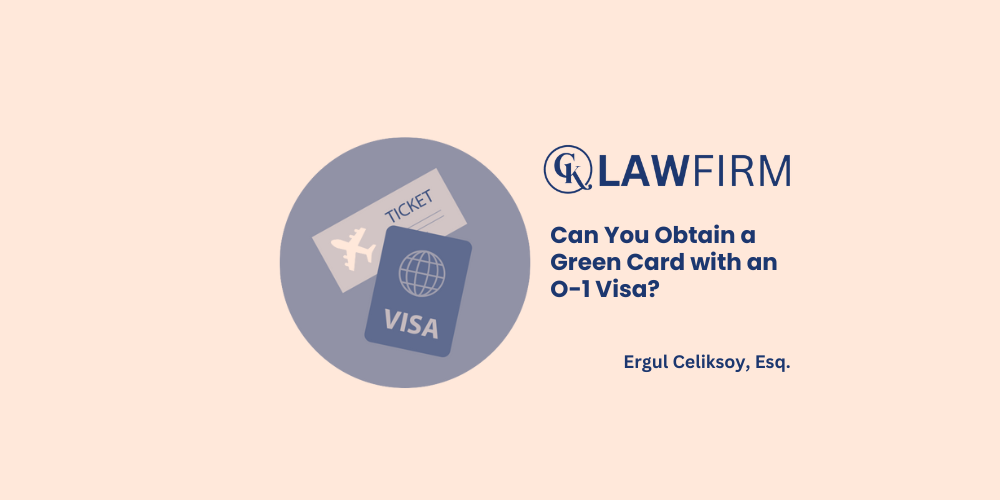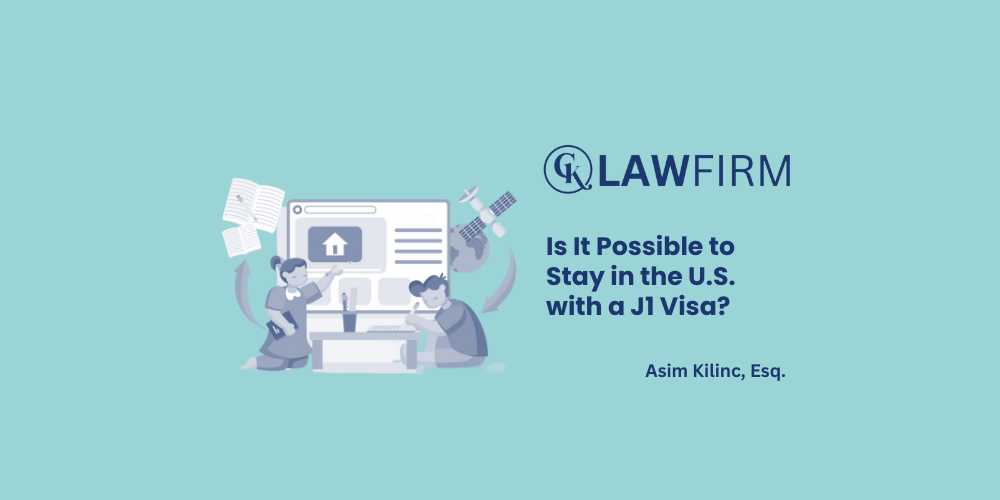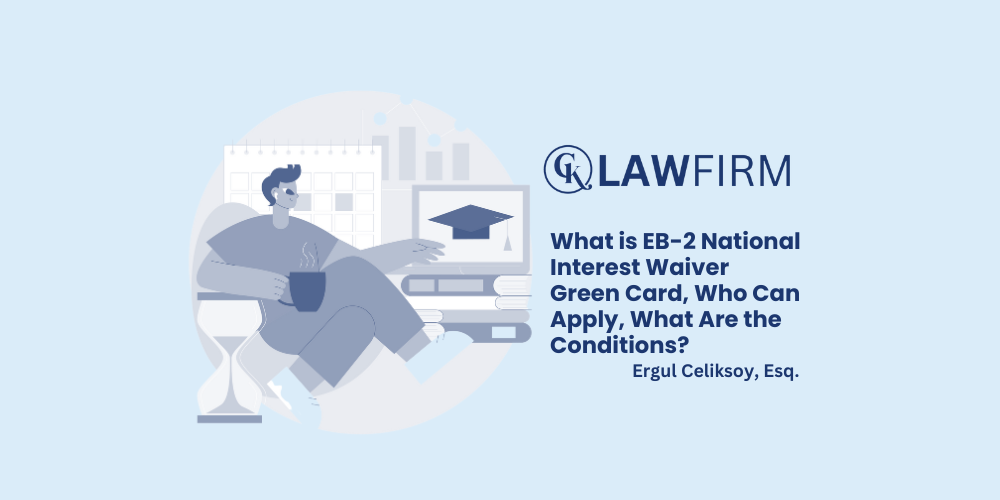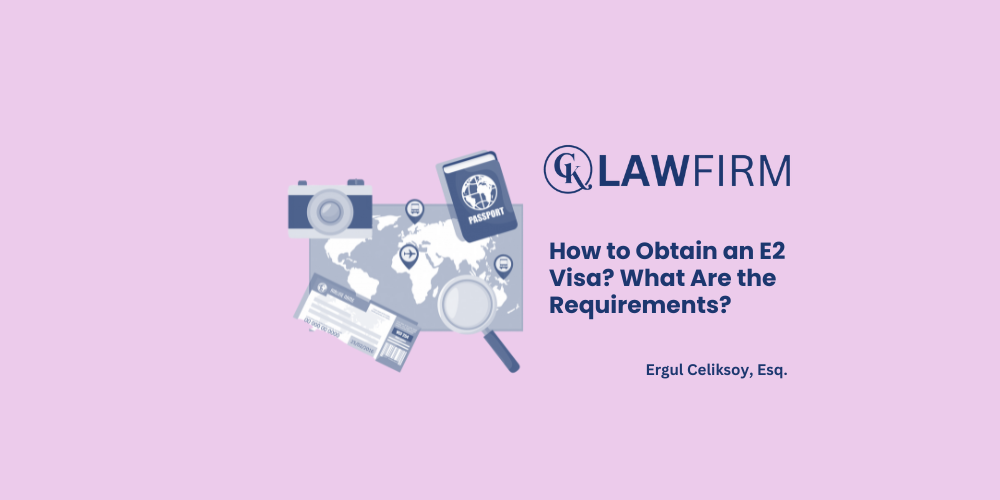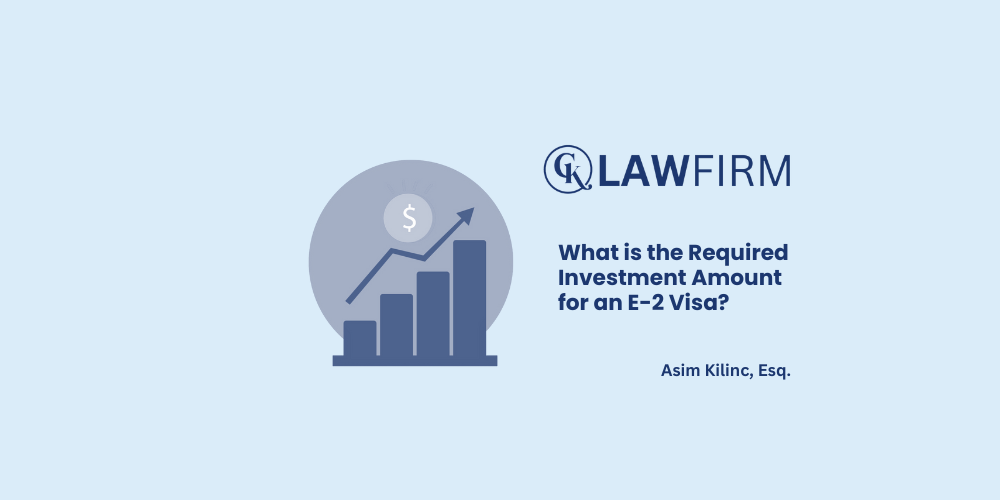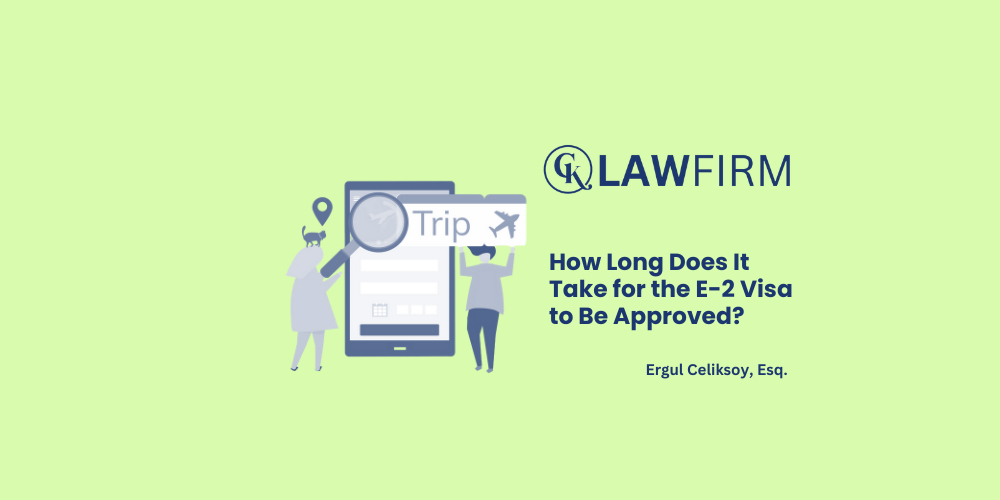Schedule an Appointment with Our Attorneys Now
By Ergul Celiksoy, Immigration Attorney at CK Law Firm
The O-1 visa, designed for individuals with extraordinary abilities, offers many professional artists and academics the opportunity to work in the United States. In this article, I will address the question, “Can you obtain a Green Card with an O-1 visa?”, along with the following topics:
- What is an O-1 Visa?
- What is a Green Card and Why is it Important?
- The Connection Between O-1 Visa and Green Card
- Pathways to Apply for a Green Card with an O-1 Visa
In this article, you will find answers to the topics listed above. If you have additional questions, feel free to ask them in the comments section of this blog or reach out to us through our website. For inquiries about other matters, you can also contact me directly via LinkedIn.
What is the O-1 Visa?
The O-1 visa is a special work visa granted to individuals with extraordinary abilities in fields such as arts, science, education, business, and sports. It allows O-1 visa holders to live and work temporarily in the United States. The initial work period is typically valid for 3 years, with the possibility of 1-year extensions for justified reasons.
Additionally, the O-3 visa is available for the spouses and children under 21 years of age of O-1 visa holders. So, who in these industries can apply for the U.S. O-1 visa?
- Arts: Musicians, actors, painters, and other creative professionals.
- Science: Researchers and scientists with notable academic achievements.
- Business: Executives and entrepreneurs.
- Sports: Professional athletes with international accomplishments.
The U.S. O-1 visa application is divided into two categories: O-1A and O-1B.
- O-1A: Designed for professionals with extraordinary abilities in fields such as science, business, and similar areas.
- O-1B: Tailored for artists, serving as the O-1 artist visa for individuals in creative professions.
What is a Green Card, and Why is it Important?
A Green Card is an official document that grants individuals the right to live and work permanently in the United States. Officially known as “Permanent Resident Status”, it allows holders to reside and work in the U.S. without being tied to a specific visa type. Additionally, Green Card holders are eligible to apply for U.S. citizenship.
This document also provides access to many social services and allows holders to sponsor family members. For those making long-term plans, a Green Card is highly significant. Its associated rights and additional benefits make it an attractive option for professionals worldwide.
Green Card Application Process
The Green Card application process is a detailed and carefully monitored procedure. With multiple pathways available, the process for professionals varies depending on the chosen route. For employer-sponsored applications, critical steps such as PERM Certification are required. Additionally, applicants must complete Form I-485 for status adjustment.
- PERM Certification: This step involves the employer proving that the position cannot be filled by the U.S. labor market.
- Form I-485: This is the application form that formalizes the applicant’s request for a status adjustment.
Green Card Fees
Applying for a Green Card involves specific costs, and planning for these expenses in advance is crucial for a smooth process. Proper preparation helps avoid unexpected financial surprises. The typical fees include:
- Filing Fees: Between $1,200 and $1,500.
- Biometric Processing Fee: $85.
- Form I-485 Fee: $1,140.
The Connection Between O-1 Visa and Green Card
A Green Card can be obtained with an O-1 visa, but it is not mandatory. However, it offers a significant advantage for transitioning to permanent residency. Individuals who can demonstrate their extraordinary abilities may apply for a Green Card through various pathways.
Transitioning from O-1 Visa to Green Card
The O-1 visa offers significant advantages for obtaining a Green Card. Individuals with proven extraordinary abilities often qualify to apply directly through the EB-1 category. Employer sponsorship or family connections can also support this transition.
Does the O-1 Visa Require a Green Card?
The O1 visa is a temporary work visa in the United States, so a Green Card is not mandatory. However, for individuals planning to work and live in the U.S. long-term, applying for a Green Card is recommended. This not only secures your legal status permanently but also grants you additional rights and benefits.
Pathways to Apply for a Green Card with an O-1 Visa
O1 visa holders can apply for a Green Card if they successfully demonstrate their extraordinary abilities. The process can be initiated through the EB-1 category or employer sponsorship. But what do these pathways entail?
- EB-1 Category: Individuals who have demonstrated extraordinary abilities can directly apply for a Green Card through the EB-1 category, without the need for employer sponsorship.
- Employer Sponsorship: O1 visa holders can apply for an Employment-Based Green Card with the sponsorship of their U.S. employer.
- Family Connections: A family member who is a U.S. citizen can act as a sponsor for the O1 visa holder’s Green Card application.
While a Green Card is not mandatory for O-1 visa holders, transitioning from an O-1 visa to a Green Card is entirely possible. For any questions regarding this process, feel free to reach out through the comments section of this blog or via the CK Law Firm official website. Additionally, for discussions on specific topics, you can message me directly on LinkedIn.
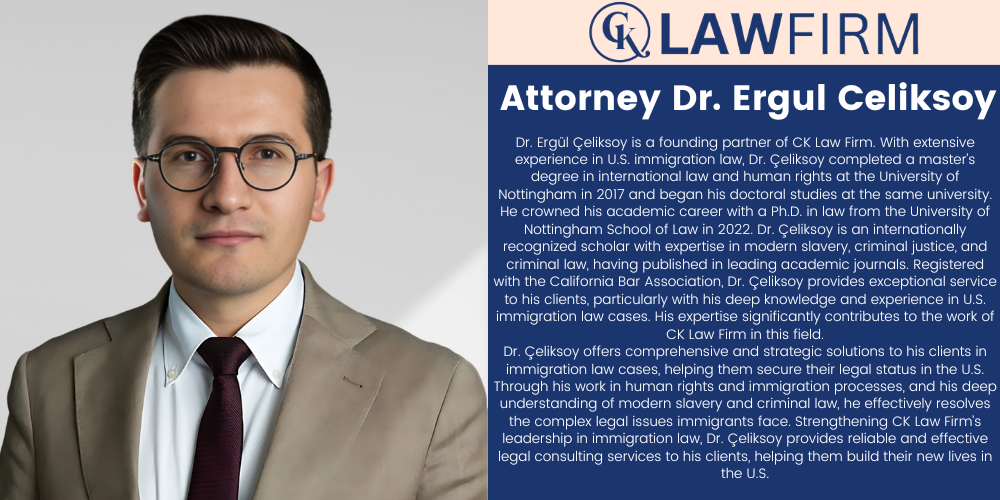
By Asim Kilinc, Immigration Attorney at CK Law Firm
The United States offers numerous visa types that provide opportunities for education, work, and cultural exchange from all around the world. One of these visa types is the J1 visa, which allows participants to live temporarily in the U.S. and take part in specific programs. However, one of the most important questions for J1 visa holders is whether they can continue to stay in the U.S. after their visa expires. By reading this article, you’ll gain detailed insights into the following topics:
- What is a J1 Visa, and Who is it For?
- How Can You Stay in the U.S. with a J1 Visa?
If you have questions beyond these topics about the J1 visa, please remember that you can reach out to me through the comment section below this article, by sending a direct message on LinkedIn, or through the website of CK Law Firm, where I am a co-founder.
What is a J1 Visa, and Who is it For?
A J1 visa is a type of visa granted to individuals who wish to come to the United States temporarily under specific educational, training, research, or cultural exchange programs. This visa is typically suitable for university students, interns, teachers, researchers, professors, and other exchange program participants. The J1 visa is issued for participation in programs approved by the U.S. government, and its duration is limited to the length of the program.
How Can You Stay in the U.S. with a J1 Visa?
For those who wish to continue staying in the U.S. with a J1 visa, there are several pathways available. However, each of these pathways has its own specific conditions and challenges.
Changing Visa Status
Before the J1 visa expires, some individuals may be able to continue staying in the U.S. by changing their visa status. This change of status is typically achieved by transitioning to one of the following visa types:
- F1 Student Visa: If the J1 visa holder plans to enroll in an educational program in the U.S., they may transition to an F1 student visa. This transition allows the individual to continue their education and remain in the U.S. legally. However, the possibility of this transition depends on the nature of the education received under the J1 visa and the visa conditions.
- H1B Work Visa: If an employer wishes to hire the J1 visa holder, they can transition to an H1B work visa. The H1B visa is designed for highly skilled workers and offers the possibility of permanent employment in the U.S. However, transitioning to an H1B visa requires a specific job offer and employer sponsorship.
- O1 Extraordinary Ability Visa: Individuals with extraordinary abilities, particularly those successful in the arts, sciences, education, business, or athletics, may apply for an O1 visa. This visa is granted for the individual to work on a specific job or project that showcases their talents.
Waiver Application
Many J1 visa holders are required to return to their home countries after their visa expires due to the “Two-Year Home Country Physical Presence Requirement.” However, in certain cases, this requirement can be waived by applying for a waiver. A waiver application may be submitted in the following situations:
- Intent to Permanently Reside in the U.S.: If the J1 visa holder intends to reside permanently in the U.S. and their plans would be significantly impacted by returning to their home country, they may apply for a waiver.
- Critical Reason: A waiver application may be appropriate in situations where returning to the home country would pose significant health, safety, or other critical risks to the J1 visa holder.
- U.S. Citizen Spouse or Child: If the J1 visa holder is married to a U.S. citizen or has a U.S. citizen child, they may apply for a waiver to preserve family unity.
The waiver application process is complex, and each case is carefully evaluated by the U.S. Citizenship and Immigration Services (USCIS). Approval of a waiver application means that the individual will be exempt from the two-year return requirement, making it possible to stay in the U.S.
For more information on the “Two-Year Home Country Physical Presence Requirement” and how to obtain a waiver, you can read our article, “What is the J1 Visa Two-Year Rule and How to Get it Waived?“
Green Card Application
J1 visa holders who wish to permanently reside in the U.S. can apply for a Green Card. A Green Card grants the individual permanent residence and work rights in the U.S. However, the Green Card application process can be complex and lengthy. Typically, a Green Card application can be made through the following ways:
- Family Sponsorship: A U.S. citizen or Green Card holder can sponsor a J1 visa holder as a family member for a Green Card application.
- Employer Sponsorship: If the J1 visa holder is sponsored by a U.S. employer, they can apply for a Green Card through employer sponsorship. This is usually possible after transitioning to an H1B visa.
- Extraordinary Abilities: Individuals with extraordinary abilities who are eligible for an O1 visa can use their talents to apply for a Green Card.
The Green Card application process requires a lengthy procedure and must be supported by various legal formalities and documentation. Getting assistance from an experienced immigration attorney during this process can help ensure a smoother process.
Conclusion
Staying in the U.S. with a J1 visa is possible, but it requires careful planning, legal support, and taking the right steps. Understanding options such as status change, waiver applications, and the Green Card process can help you achieve your goal of staying in the U.S. Evaluating your options after the J1 visa will allow you to take the most appropriate step for your future.
Due to the complexity of the process and legal requirements, seeking support from an immigration attorney can be beneficial. Remember that you can reach out to me through CK Law Firm’s website, at info@cklawfirm.org, or directly on LinkedIn!
Who is Lawyer Asım Kılınç?
Lawyer Asım Kılınç, as a founding partner of CK Law Firm, stands out with his mastery of both international law and the American legal system, gained through years of experience. Completing his Master’s degree at Southern Methodist University Dedman School of Law, Kılınç is registered with the Missouri Bar and specializes in U.S. immigration law. His deep knowledge and experience in immigration law have significantly contributed to CK Law Firm’s successes in this field. Having participated in the preparation processes of over 1,000 cases in immigration law, Lawyer Kılınç has proven his expertise in this field, providing comprehensive and professional legal support to his clients, facilitating their adaptation to their new lives in the U.S.
Strengthening CK Law Firm’s leadership in immigration law, Lawyer Kılınç offers reliable and effective legal consultancy services to his clients, standing by them in their journey to establish a new life in the U.S. He works to ensure that his clients receive the highest quality service in citizenship, Green Card, work permit, and other immigration processes, providing support to his clients throughout the entire process, from the beginning to U.S. citizenship.
By Ergul Celiksoy, Immigration Attorney at CK Law Firm
In this article, Dr. Ergül Çeliksoy, founding attorney of CK Law Firm, provides answers to the most frequently asked questions about the EB2 National Interest Waiver (EB2 NIW) Green Card process. By reading this article, you will find answers to the following questions:
- What is EB2 National Interest Waiver Visa?
- What are the Advantages of EB2 NIW Visa?
- Who Can Apply for EB2 NIW Visa?
- What are the Application Requirements for EB2 NIW Visa?
- Criterion 1: Advanced Degree
- Criterion 2: National Interest (Potential to Make a Positive Contribution to the United States)
- Criterion 3: You are an expert and competent in your field
- Criterion 4: It is in America’s interest to approve your application when your entire application is considered
- How does the EB2 NIW visa application process work?
EB2 National Interest Waiver Visa: What is it?
The EB2 National Interest Waiver visa, also known as the Benefit Waiver, is a Green Card-based visa type that you can apply for without any sponsor or employer. With the EB2 NIW visa, you can obtain a Green Card and live and work in the United States. Moreover, after living in the US for 5 years with this visa, you can apply for US citizenship. This visa allows both you and your family to live in the US and eventually become US citizens.
The main philosophy behind the EB2 NIW visa is to provide experts in their fields with the opportunity to obtain a Green Card, live, and work in the US, thus promoting brain drain. By designing this visa, the US aims to attract successful individuals from different countries to come to the US, continue their professional lives, and contribute positively to the country. In this article, I will explain in detail who can apply for this visa, the requirements of the visa, how to meet these requirements, and how the application process is managed.
What are the Advantages of EB2 NIW Visa?
The EB2 NIW visa has many advantages, including:
- You do not need a job offer from a US employer or a sponsor to apply for the EB2 NIW visa. You can apply based on your work experience and achievements in your field. This is a significant advantage.
- After obtaining a Green Card with the EB2 NIW visa, you are not obligated to work for any specific employer. You can change employers as you wish or even start your own business. The important thing is that you continue to work in your field.
- You do not need to make any investment in the US for the EB2 NIW visa. You only need to pay the visa fees to apply. If you choose to follow the process with a lawyer, there will be legal fees. However, unlike some other visa types, you do not need to make any investment or maintain a large amount of money in your bank account.
- You do not need to be in the US to apply for the EB2 NIW visa. You can manage the process from Turkey. It is possible to apply for this visa and follow the process both from within and outside the US. Therefore, if you are not currently in the US, there is no need to worry because you can handle all the necessary procedures for this visa from outside the US.
- Since this is an immigration visa, you receive a Green Card through this visa and can become a US citizen in the future.
- If you are married and have children, they can also obtain a Green Card through you and come to the US with you.
The EB2 NIW visa has many more advantages like these. Therefore, many successful individuals from around the world choose this visa and take their first steps toward a new life in the US.
Who Can Apply for EB2 NIW Visa?
The EB2 NIW visa is a suitable visa type for individuals who are experts and successful in their fields. This visa can be applied for by successful academics, doctors, engineers, IT professionals, senior executives, artists, and athletes.
In fact, there is no specific restriction on who can apply based on their profession. The main criterion here is that the applicants are highly successful in their fields and can support this with documents. Generally, the EB2 NIW visa is preferred by academics, doctors, engineers, athletes, and artists. Most of our clients also belong to these professional groups.
If you are successful in your field and believe that you meet the criteria for the visa, you can send us your detailed and up-to-date CV by email for a free evaluation. Our team will assess whether you meet the criteria for the EB2 NIW visa and inform you of our opinion. If our initial review indicates that you meet the criteria for this visa, we will conduct a free 30-minute Zoom meeting with you to evaluate your eligibility in more detail. For more information, you can send your CV to us by email right away!
What are the Application Requirements for EB2 NIW Visa?
As briefly mentioned above, the main philosophy of the EB2 NIW visa is to encourage brain drain. Therefore, this visa can be applied for by individuals who are experts and successful in their fields. There are four main criteria for the EB2 NIW visa. I will now explain these criteria one by one:
CRITERIA 1: Advanced Degree
The first requirement for the EB2 NIW visa is that the applicant must have an advanced degree. This advanced degree means:
- The applicant must have at least a Master’s degree or higher in their field. If you have a Master’s or Doctorate degree, you can easily meet this criterion.
- If you do not have a Master’s or Doctorate degree, you must have at least a Bachelor’s degree and at least 5 years of work experience in your field.
If you meet these conditions, you satisfy the advanced degree requirement. The key thing to note here is that your education must be in your current field of expertise. For example, if you are a doctor applying for this visa, you must use your medical education to meet this requirement. However, if you currently work in IT but have a degree in a different field like economics, your education may not meet the advanced degree requirement for the EB2 visa.
Generally, this first criterion is the easiest to meet. In most of our applications, we have not encountered any issues related to the advanced degree. You do not need to have completed your education in the US to apply for the EB2 NIW visa. You can apply with the education you completed at a university in Turkey, and you will generally not face any issues. If you have questions about whether your education is suitable for this visa, please contact us.
CRITERIA 2: National Interest (Having the Potential to Make a Positive Contribution to America)
The second criterion for the EB2 NIW visa is related to how continuing your work in the US will contribute to the US. As mentioned at the beginning of the article, this visa is designed to encourage brain drain. By granting you this visa, the US expects you to contribute positively to the country. The nature of this contribution can vary for each applicant. However, the main point here is that the criterion of contributing to the US is the most crucial and requires the most thought in the context of the EB2 NIW visa.
Contribution to the US:
In your EB2 NIW visa application, you need to include a statement explaining what job you will do in the US. You should describe the job you will do related to your field of expertise and explain its importance to the US. Each applicant’s situation is different here. For example, for academics, doctors, and engineers, the contribution to the US is generally more concrete.
For instance, a physics academician can claim that continuing their academic work in the US will contribute academically to the field of physics. Or, a doctor specializing in cardiac surgery can state that continuing their work in this field will contribute to the healthcare sector in the US. In our office, we conduct individual meetings with each client to thoroughly evaluate the contribution to the US and prepare a comprehensive plan for the EB2 NIW application.
Assessment of the Contribution to America Criteria:
When your application is evaluated, your claimed contribution to the US is examined in two ways:
- First, is the job you intend to do in the US of substantial merit? In other words, is the job you will do genuinely important and valuable?
- Second, does this job have the potential to contribute to the US in general?
We evaluate the contribution criterion in detail during the meetings we conduct with you while preparing your application. This often involves researching the reflections and current developments in your field in the US. It is particularly useful to consider the strategic policies of the US government, both at the federal and local levels, related to your field of expertise.
CRITERION 3: Expertise and Competence in Your Field
The third criterion for the EB2 NIW visa is that you must be an expert and competent in your field. You can demonstrate this with numerous documents related to your work in your field. You can show your expertise and competence in your field through:
- Your work experience,
- Successful projects you have completed in your field,
- Contributions to your field,
- Reference letters from other experts in your field,
- Your national and international publications in your field,
- Presentations at conferences,
- Interviews and news about you.
If you send us your detailed CV by email, we will evaluate it in terms of the EB2 NIW visa and provide you with our opinion. One important thing to note about the expertise and competence criterion is that your field of expertise should align with the job you intend to do in the US. For example, if you are a successful economist, the job you plan to do in the US should also be related to this.
CRITERION 4: The Overall Evaluation of Your Application Being in the US’s Interest
The final criterion for the EB2 NIW visa is related to the overall evaluation of your application. Essentially, this criterion is about how strong your application is when the first three criteria are considered together. If the first three criteria are positive, this final criterion is generally met.
Conclusion
There are many details related to the EB2 NIW visa. The application packages we prepare for our clients generally range from 400-500 pages. It is necessary to provide convincing documents and explanations for each criterion explained here. If you ask me, if you have the dream of living and working in the US, the EB2 NIW visa is definitely an option you should consider.
Who is Attorney Dr. Ergül Çeliksoy?
Attorney Dr. Ergül Çeliksoy is the co-founder of CK Law Firm. Dr. Çeliksoy has extensive experience in US immigration law. He completed his master’s degree in international law and human rights law at the University of Nottingham in 2017 and began his PhD at the same university. In 2022, he completed his law doctorate at the University of Nottingham School of Law, enhancing his academic career. Dr. Çeliksoy is a registered member of the California Bar and provides excellent service to his clients with his deep knowledge and experience in US immigration law cases. His expertise in immigration law adds valuable contributions to CK Law Firm’s work in this field.
Dr. Çeliksoy offers comprehensive and strategic solutions to his clients in immigration law cases, helping them secure their legal status in the US. In his work on human rights and immigration processes, his deep knowledge of modern slavery and criminal justice issues allows him to effectively resolve the complex legal problems faced by immigrants. Dr. Çeliksoy reinforces CK Law Firm’s leadership in immigration law by providing reliable and effective legal advisory services, helping his clients build new lives in the US.
By Ergul Celiksoy, Immigration Attorney at CK Law Firm
The E2 visa is a non-immigrant visa designed specifically for entrepreneurs who wish to invest in and establish a business in the United States. This visa is available to citizens of countries that have trade and investment treaties with the U.S. Turkish citizens are eligible to apply for the E2 visa under this agreement. The E2 visa covers not only the investor but also their spouse and unmarried children under 21. In this article, we will cover the following topics:
- What is the E2 Visa?
- What Are the Requirements for an E2 Visa?
- Required Documents for an E2 Visa Application
- The E2 Visa Application Process
- The E2 Visa Renewal Process
If you have additional questions about the topic, feel free to contact me via the comments section below this article, through LinkedIn messaging, or on the official CK Law Firm website!
What is the E2 Visa?
The E2 visa is a business visa offered to individuals who wish to establish a business or invest in an existing business in the United States. This visa aims to directly create jobs and contribute to the U.S. economy.
Scope: The visa holder is allowed to actively manage and operate a business based on their investment.
Duration: This visa is typically issued for an initial period of 2 years, but it can be renewed as long as the investment continues.
Family Members: The spouse of the visa holder can obtain a work permit, and their children can pursue education in the U.S.
What Are the Requirements for an E2 Visa?
Certain criteria must be met to apply for an E2 visa:
- Investor’s Nationality: The applicant must be a citizen of a country that has an E2 treaty with the U.S. Turkey is one of these countries.
- Substantial Investment: The investment amount must be significant, depending on the nature of the business, and must be “at risk.” Generally, investments of $100,000 or more are considered sufficient.
- Active Business Management: The investor must actively manage the business. Passive investments, such as real estate ownership, do not qualify.
- Economic Contribution: The business must positively impact the U.S. economy. Creating jobs through the business is a key factor.
- Profit Motive: The business must aim to generate profit, and the investment should demonstrate sustainability.
Required Documents for an E2 Visa Application
To apply for an this visa, the following documents must be prepared:
- Passport: A valid passport.
- DS-160 Form: The non-immigrant visa application form.
- Proof of Investment: Bank statements, contracts, and other financial records.
- Business Plan: A detailed business plan explaining the investment and the business’s economic benefits.
- Business Documents: Business registration, licenses, and incorporation papers.
- Consular Appointment Confirmation: Confirmation of the interview appointment at the U.S. consulate.
E2 Visa Application Process
The E2 visa application process includes the following steps:
Preparation of Business Plan and Investment:
A detailed business plan must be prepared, covering financial projections, expected profits, and contributions to the U.S. economy. The investment must be at risk and geared toward commercial activities.
Collection of Required Documents:
All necessary documents, including proof of investment, financial status, and business management records, must be gathered.
Consular Interview:
After submission, an interview is conducted at the U.S. consulate. During the interview, the sustainability of the investment and the applicant’s understanding of the business plan are evaluated.
Visa Approval and Entry Authorization:
Upon successful completion of the interview, the E2 visa is granted. The visa holder can then enter the U.S. and commence their business operations.
E2 Visa Renewal Process
The E2 visa is initially granted for 2 years. However, it can be renewed indefinitely as long as the investment remains active. During the renewal process, it is essential to prove that the business is still operational and continues to contribute to the U.S. economy.
Conclusion
The E2 visa application process is complex and requires meticulous attention to detail. Errors in the application can lead to delays or denial. CK Law Firm, with its experienced immigration attorneys, can simplify your E2 visa application process. For professional support, detailed information, and consultation services, reach out to us via cklawfirm.org, email us at info@cklawfirm.org, or connect with us on LinkedIn.
Who is Attorney Ergül Çeliksoy?
Attorney Dr. Ergül Çeliksoy is a founding partner of CK Law Firm and also serves as an Assistant Professor of Law at the University of Nottingham. With extensive experience in U.S. immigration law, Dr. Çeliksoy completed a Master’s degree in international law and human rights law at the University of Nottingham in 2017, followed by a Ph.D. at the same university. His Ph.D., completed in 2022 at the University of Nottingham School of Law, marked a significant milestone in his academic career. Dr. Çeliksoy has published extensively in leading academic journals and is internationally recognized for his expertise in modern slavery, criminal justice, and criminal law. As a member of the California Bar, Dr. Çeliksoy offers exceptional service to his clients, particularly in U.S. immigration law cases. His expertise and experience in immigration law significantly contribute to CK Law Firm’s work in this area.
Dr. Çeliksoy provides comprehensive and strategic solutions to his clients in immigration law cases, helping secure their legal status in the U.S. His work on human rights and immigration processes, particularly in modern slavery and criminal law, effectively addresses the complex legal issues immigrants face. Dr. Çeliksoy reinforces CK Law Firm’s leadership in immigration law by offering reliable and effective legal consulting services to his clients, helping them build new lives in the United States.
By Asim Kilinc, Immigration Attorney at CK Law Firm
The E-2 visa offers opportunities for entrepreneurs who wish to invest in the United States. One of the most frequently asked questions by those considering applying for this visa is the required investment amount. While there is no fixed minimum investment amount stipulated for the E-2 visa, the investment must be substantial and appropriate to the nature and scale of the business. This article will discuss the details of the required investment, how applications are evaluated, and how to document the investment:
- Is There a Minimum Investment Amount for an E-2 Visa?
- How is the E-2 Visa Investment Evaluated?
- What Documents are Required to Prove the Investment Amount?
If you have additional questions about this topic, feel free to contact me through the comments section below, send me a direct message on LinkedIn, or reach out via the website of CK Law Firm, where I am a co-founder.
Is There a Minimum Investment Amount for an E-2 Visa?
There is no legally defined fixed minimum investment amount for the E-2 visa. Instead, the investment is expected to meet the following criteria:
- “Substantial” Amount: The investment amount must be substantial relative to the type and activity of the business. For small businesses, an investment of around $100,000 is generally considered sufficient, but larger enterprises may require more.
- Appropriate for the Type of Business: The investment should align with the business’s size, sector, and activities. For example, the required investment for opening a restaurant may differ significantly from that of a technology start-up.
- Risk of Loss: The investor must bear the risk of losing the invested capital. Passive investments, such as purchasing real estate, are typically not eligible.
How is the E-2 Visa Investment Evaluated?
In E-2 visa applications, the investment is assessed not just in terms of its amount but also its contribution to the business and the economic value it generates:
- Completed Investment: A significant portion of the investment should be made before the business becomes operational. Expenses such as purchasing equipment, leasing property, and marketing costs fall under this category.
- Business Sustainability: The investment must establish a capital structure that enables the business to sustain its operations. Insufficiently funded businesses may face negative evaluations during the application process.
- Contribution to the Local Economy: The business’s ability to create jobs and contribute to the U.S. economy is a crucial factor in evaluating the investment.
What Documents are Required to Prove the Investment Amount?
To support an E-2 visa application, detailed documentation proving the investment amount and expenditures must be provided. Some of the required documents include:
- Financial Records: Bank statements, wire transfer records, and loan documents.
- Invoices and Contracts: Invoices for expenditures, lease agreements, and purchase contracts.
- Business Plan: A detailed business plan outlining the short- and long-term goals, financial projections, and expected profitability of the business.
- Business Records: Official business formation documents and licenses.
Providing complete documentation is critical for a favorable evaluation of the application.
Conclusion
The investment amount for an E-2 visa must align with the size and sector of the business and ensure its sustainability. Proper documentation of the investment and a detailed business plan significantly increase the chances of approval. At CK Law Firm, we handle every detail of your E-2 visa process to ensure fast and successful outcomes. For professional assistance, detailed information, and consultancy services, you can contact us through cklawfirm.org, via email at info@cklawfirm.org, or on LinkedIn.
Who is Attorney Asım Kılınç?
Attorney Asım Kılınç is the co-founder of CK Law Firm and is recognized for his expertise in immigration law and U.S. asylum applications. Kılınç completed his Master’s degree at Southern Methodist University Dedman School of Law and is a member of the Missouri Bar Association, with a focus on U.S. immigration law.
Attorney Kılınç’s extensive knowledge and experience in immigration law have significantly contributed to CK Law Firm’s success in this field. He has actively participated in the preparation of over 1,000 cases, demonstrating his expertise in this area. By providing comprehensive and professional legal support to his clients, he helps them adapt to their new lives in the U.S.
Attorney Kılınç is also well-versed in U.S. asylum applications. He meticulously guides his clients through the process and ensures they receive the best legal advice. He provides top-quality service to clients in matters of citizenship, Green Card, work permits, and other immigration processes, supporting them from start to finish on their journey to U.S. citizenship.
Attorney Asım Kılınç, who solidifies CK Law Firm’s leadership in immigration law and U.S. asylum applications, offers reliable and effective legal consultancy services to clients, assisting them in building a new life in the U.S.
By Ergul Celiksoy, Immigration Attorney at CK Law Firm
The E-2 visa is an ideal visa type for investors who want to start a business or manage an existing one in the United States. However, for applicants, the processing time is a critical concern. The processing time for the E-2 visa varies depending on where the application is submitted, the completeness of the application file, and the workload of the processing authority. In this article, we will discuss in detail how the process works, the factors that affect the timeline, and what can be done to expedite applications:
- What Factors Influence E-2 Visa Processing Times?
- Key Factors Impacting E-2 Visa Processing Time
- Tips to Expedite the E-2 Visa Process
If you have additional questions about this topic, don’t forget that you can reach out to me through the comments section below, send me a message directly on LinkedIn, or contact me via the website of CK Law Firm, where I am a co-founder.
What Factors Influence E-2 Visa Processing Times?
The E-2 visa application process differs depending on whether the application is filed from within the United States or at a U.S. consulate abroad:
- Consular Applications: Applications submitted at a U.S. consulate abroad typically result in faster processing times. The timeline for consular applications depends on the appointment date, the consulate’s workload, and country-specific procedures. Most cases are processed within 2 to 8 weeks.
- USCIS Applications: If the application is filed from within the U.S., it is reviewed by USCIS (United States Citizenship and Immigration Services). This process usually takes longer and can range from 2 to 6 months. However, with USCIS’s Premium Processing service, the application can be processed within 15 days for an additional fee.
Key Factors Impacting E-2 Visa Processing Time
Several factors influence how long it takes to process an E-2 visa application:
- Completeness of the Application File: A complete and accurate application file can significantly speed up the process. Missing or incorrect documents may result in requests for additional evidence, which can delay the process.
- Workload at the Consulate or USCIS: The processing time can be affected by the workload at the time of submission. Periods of high demand, such as holiday seasons, can extend the timeline.
- Appointment Wait Times: For consular applications, the wait time for an appointment can impact the overall processing time. In some cases, securing an appointment may take several weeks.
- Applicant’s Background: Factors such as the applicant’s travel history, U.S. entry and exit records, or inconsistencies in their documentation can also affect the review timeline.
Tips to Expedite the E-2 Visa Process
To ensure faster processing of an E-2 visa application, consider the following steps:
- Submit Complete and Accurate Documentation: From the application form to supporting documents, it is crucial to ensure all paperwork is complete and accurate. Provide detailed and clear information, particularly regarding the business plan, investment amount, and the legality of the business.
- Seek Professional Assistance: Working with an immigration attorney for complex applications like the E-2 visa ensures that your file is complete and well-prepared. At CK Law Firm, our experienced team is here to guide you through the process.
- Use Premium Processing: For applications filed within the U.S., USCIS offers a fast-track service that guarantees processing within 15 days for an additional fee.
- Monitor Consular Appointment Availability: For consular applications, regularly check appointment availability and apply for the earliest possible date.
Conclusion
While E-2 visa processing times vary based on several factors, proper planning and professional assistance can help minimize the timeline. At CK Law Firm, we are dedicated to helping you successfully complete your E-2 visa application. For more information about visa processes or to receive professional assistance, contact us through cklawfirm.org, email us at info@cklawfirm.org, or connect with us on LinkedIn.
Who is Attorney Ergül Çeliksoy?
Attorney Dr. Ergül Çeliksoy is a founding partner of CK Law Firm and also serves as an Assistant Professor of Law at the University of Nottingham. With extensive experience in U.S. immigration law, Dr. Çeliksoy completed a Master’s degree in international law and human rights law at the University of Nottingham in 2017, followed by a Ph.D. at the same university. His Ph.D., completed in 2022 at the University of Nottingham School of Law, marked a significant milestone in his academic career. Dr. Çeliksoy has published extensively in leading academic journals and is internationally recognized for his expertise in modern slavery, criminal justice, and criminal law. As a member of the California Bar, Dr. Çeliksoy offers exceptional service to his clients, particularly in U.S. immigration law cases. His expertise and experience in immigration law significantly contribute to CK Law Firm’s work in this area.
Dr. Çeliksoy provides comprehensive and strategic solutions to his clients in immigration law cases, helping secure their legal status in the U.S. His work on human rights and immigration processes, particularly in modern slavery and criminal law, effectively addresses the complex legal issues immigrants face. Dr. Çeliksoy reinforces CK Law Firm’s leadership in immigration law by offering reliable and effective legal consulting services to his clients, helping them build new lives in the United States.
Subscribe to Our Newsletter
Subscribe to our newsletter to stay informed about the latest announcements and articles written by our attorneys on U.S. immigration processes.
Aout Us
Our experienced lawyers at CK Law Firm offer effective solutions for those who want to make new beginnings in the USA. We facilitate and accelerate your immigration process by providing consultancy on all visa types.
Our Services
Visas
Business Green Card
Family Green Card
US Citizenship
Talent and Performance Visas
Work Visas
Investor and Trader Visas
Contact Us
+1 (972) 363- 96 89
info@cklawfirm.org
Address
2800 Regal Rd #102, Plano, TX 75075

All Rights Reserved by CK Law Firm.


